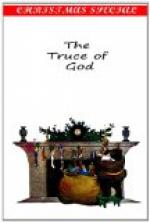“It was sent me yesterday across the lake by a Benedictine monk,” he said, when Father Omehr had finished reading and raised his eyes in wonder and delight.
“And who has written it?”
“A namesake of mine—a Benedictine. It was not seen until after his death, when the manuscript was discovered in his cell. What is more remarkable is that the monk was distinguished for nothing but his piety, and had never made any pretension to learning or accomplishment.”
Much to the surprise of Herman, his friend, though deeply moved by that beautiful effusion of Catholic piety, seemed not to give the entire attention which it so eminently deserved.
“Listen!” he said, repeating the lines. “What melody! what tenderness! what love! You certainly must feel its exalted piety?” he added, appealing to Father Omehr.
“I do, indeed; but you perceive that I am disturbed. In brief, then—for I could not bring myself to say until now—Anno of Cologne is dead.”
Anno, Archbishop of Cologne, was revered throughout Europe in the eleventh century for his virtue and wisdom. It is said of him that, when others slept, he rose, filled with a holy zeal, and visited many churches, carrying with him his pious offerings. In the halls of kings, says the poet who celebrates his virtues, he sat with the haughtiness of the lion; in the hut of the peasant, he stood with the humility of a lamb. So obnoxious was he to the king, that Henry at one time assaulted him sword in hand; and he was only saved from death by the interposition of a monk. Alone, he founded five monasteries, including that of Siegberg, his favorite residence, where he died, and where his tomb was long pointed out to the traveller. He was said to have emitted a light, the splendor and beauty of which spread around like the lustre of a precious stone in a ring of gold.
“O God, the giver of all!” exclaimed Herman, after a pause, “in taking him to Thyself, do not leave us desolate!”
Father Omehr then described the fearful ulcers which had tormented Anno’s body, and the celestial visions and brilliant apparitions that delighted his soul and foreshadowed the bliss awaiting him in the life to come.
“But let us not weep for him whose epitaph is in the mouths of the widow and the orphan, and whose soul is in the hand of God!” said the pious chaplain of Hers, grasping the hand of his friend.
“Not for him I weep,” was the reply; “nor yet for the bereaved people of Cologne.” The missionary paused, unable to proceed, and then hurriedly exclaimed, “Who is to be his successor? Who is to appoint him?—Gregory VII or Henry of Austria!”
“He will not dare!” ejaculated the other, who not until this moment clearly understood his more keen-sighted friend.
“He who has dared to fill the sees of Liege and Milan may not scruple to dishonor the see of Cologne! But let us pray and hope; for suffer what we may, we cannot be conquered.”




